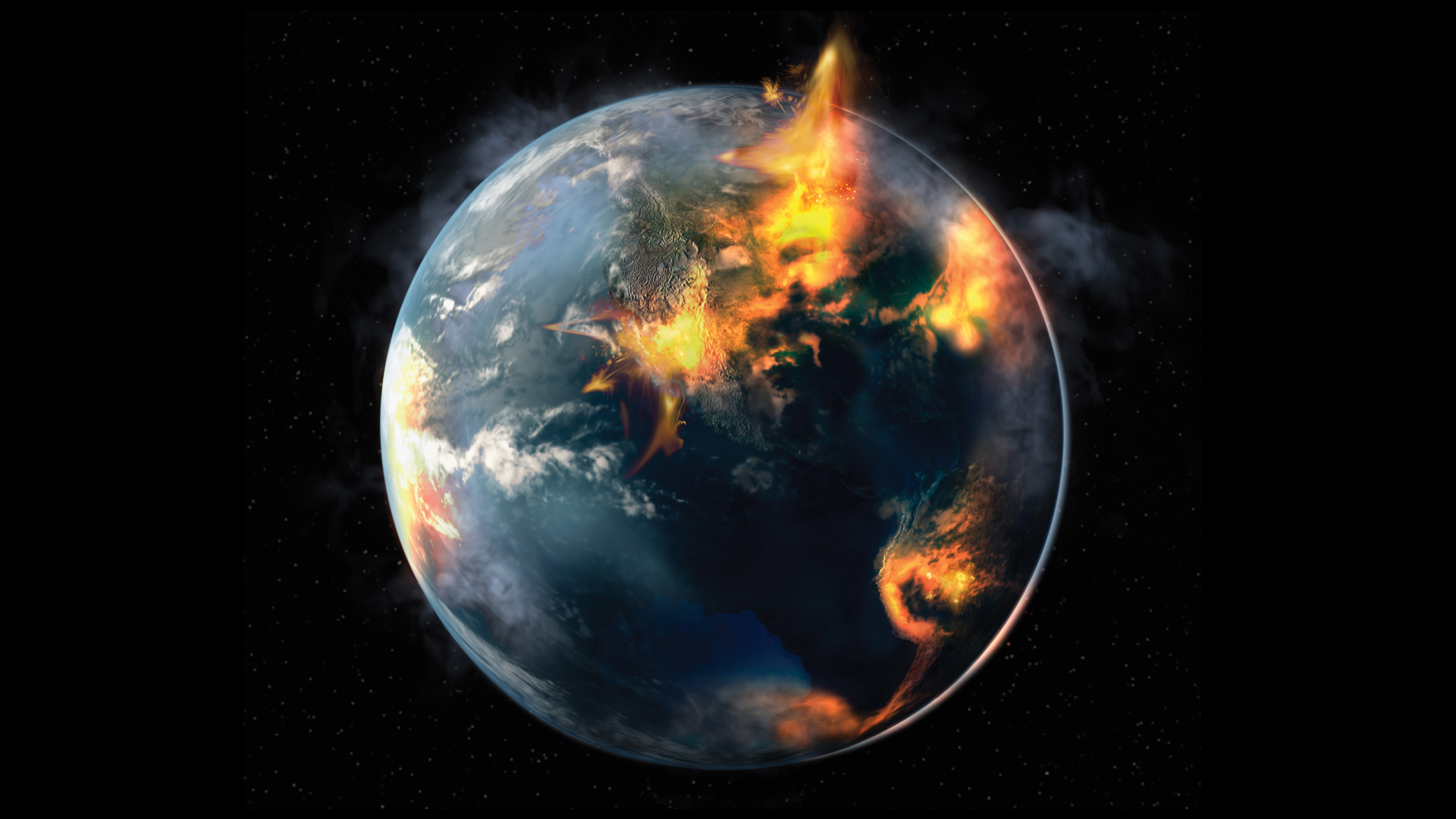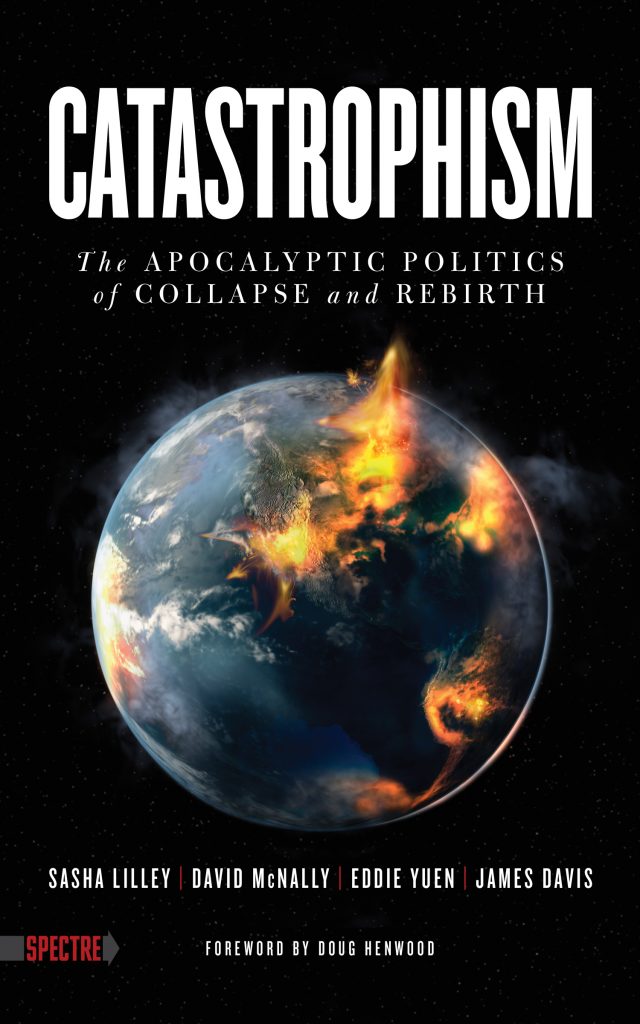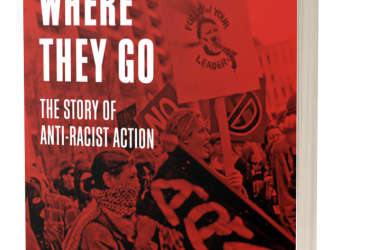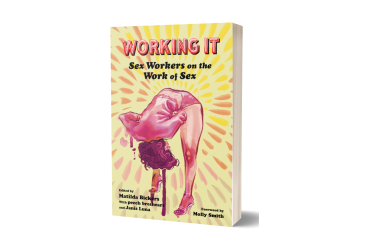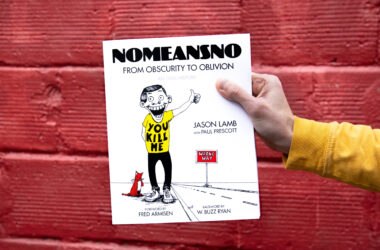by Andy Pragacz
The People’s Press
October/November 2015
Sasha Lilley is co-author of Catastrophism: The Apocalyptic Politics of Collapse and Rebirth, author of Capital and its Discon- tents: Conversations with Radical Thinkers in a Time of Tumult, both from PM Press’ political economy imprint Spectre. She is also a former Ithaca resident and the co-host and co-producer, with C.S. Soong, of Against the Grain, the thrice weekly hour- long conversation of radical ideas. Find her work at pmpress.org and free radio programs at againstthegrain.org.
People’s Press: In your most recent book you and your co-authors coin the term “catastrophism.” What’s catastrophism?
Sasha Lilley: Catastrophism is a politics based on the notion that a socie- tal collapse is coming, and that the main – or even only — hope for radi- cal social change is out of such a collapse. A related notion posits that people are most likely to move to the left, toward a more progressive political outlook, if they face an erosion in their living standards or simi- lar hardships. We argue that both ideas are misguided. The book devel- oped out of a number of conversations about this commonsense notion that things have to get really bad for people to take progressive action. Americans, so the theory says, have had it too good, and if anyone is going to see the world for what it is, they’ll need some deep shock, like an economic shock, to force the scales to fall from their eyes. It’s inter- esting that people have not entirely let go of this idea even after the 2008 economic crisis. The Great Recession was a massive shock to peo- ple’s livelihoods. At the same time, as the crisis began there was eupho- ria in some circles that capitalism was unraveling and the chance for those of us who wanted to see capitalist replaced with a more just, egal- itarian economic system was at hand. Instead of falling apart, however, the system restructured itself. Capitalism profited enormously from the crisis. Of course, a number of capitalist lost their shirts, but by and large the result was a brutal class war waged from above that increased cor- porate profits by forcing regular people to work more hours for less money. The working class ended up with less power to fight back be- cause the prospect of being unemployed loomed so large.
PP: So instead of turning people away from capitalism and into the arms of progressive movements, people became more reliant on wage work, under worse conditions?
SL: Exactly.
So, in the book we ask: what does it take to move people to radical action? We aren’t prescriptive (I wish we were!). Take strike waves, for example. Over the course of U.S. history radical collective action on the job has tended to happen during times of economic ex- pansion.
During economic contraction, however, workers turn on each other and are prone to scapegoating the marginalized, like women and people of color. Lynchings, for example, went down in the booming 1920s and up during the Great Depression of the 1930s. Of course my point here is not that people shouldn’t organize during a crisis. Our point is the opposite: people should be organizing all the time. We are trying to warn progressives about a logic that says: “we don’t have to organize because the crisis will do it for us.”
PP: And that somehow, through the crisis, the capitalist system will re- veal itself for the exploitative, oppressive system that it is.
S.L. Right. What you see is when people organize themselves effectively in a crisis, often it’s because they were already organizing themselves and had some sort of social solidarity before the crisis. The obvious case is Egypt during the Arab Spring and the U.S. civil rights movement. Rosa Parks was not just a woman who was tired and didn’t want to go to the back of the bus. She was an organizer who had been in the trenches for years. We, too, need to organize, even when it is totally unrewarding, so when a moment of crisis hits, we are much better prepared to take ac- tion.
PP: How has catastrophism negatively affected politics?
SL: It generates paralysis.
Catastrophism tends to emerge when people are in despair about their ability to collectively change the world, typi- cally when social movements are in retreat. Catastrophism presumes that fear will move people to positive political action. Fear, however, is straight out of the toolbox of the right-wing, not the left. The right is all about fear: scapegoating migrants and other minority groups, the glori- fication of authoritarian leadership to take charge in times of crisis, and so on. These are all things that should be repugnant to the left. People who are on the left or progressive, however, often get involved in rightwing projects without realizing it.
This was readily apparent in the Millennium Bug and in Peak Oil theories.
Take Y2K: the leading spokesperson, an Australian physician, got people into a frenzy by talking about possible nuclear power plant melt- downswhentheyearturnedto2000.
Theendresultwashighlyunpro- ductive (unless you were in the Bunsen burner business). People spent a lot of money on things that weren’t necessary, like survivalist gear. Scaring people like that does not move people toward an awareness of how the system works. If anything, it makes people want to pull back when the prophecy is wrong.
PP: If fear is the politics of the right, what’s the politics of the left?
SL: Traditionally the left has offered a broad utopian vision of the fu- ture. A belief that the world could be a better place, not just because the wolf is no longer at the door. It’s a politics not simply about not starving to death, but about actually living in a way that brings people together across divisions, reshapes our relationship with nature, and with ourselves as part of nature, and produces qualitatively different, fuller and more rewarding lives, at work and leisure.
This gets tricky when we think about global climate change. The solution on offer from environmentalists is one of austerity– that every- one needs to tighten their belts–which is already the politics coming from above, from the business class. Environmentalists say “we need to live simply, live with less.” The working class is already told to figure out how to feed their families with diminished wages and less governmental support, from schools to healthcare to food. Any environmental politics grounded in “doing more with less” is not going to be very convincing to the majority of people and can dovetail dangerously with the politics of the capitalist class. I think what’s important is to reframe the problem. Rather than seeing Americans as ungrateful gluttons, we need to look at how the capitalist system itself produces waste and excess. We need to think, instead, about a politics based on replacing private luxury with public abundance.
PP: So you’re saying that when we think of waste it’s usually consumer waste, like when the lettuce goes bad in my fridge, I’ve produced waste. Are you arguing, rather, that waste (or excess) is the product of a sys- tem that encourages personal consumption over production and con- sumption in common?
SL: Yes. The great feminist thinker Ursula Huws points to the fact that we don’t need a lot of things as individuals. Obviously this won’t solve the global climate change problem, but wouldn’t it be a much better idea to own a lawn mower collectively as a neighborhood, rather than every single person owning one individually? How frequently do you use it? Capitalism is full of what seems like irrationality (although it isn’t if you’re in the business of turning a profit).
PP: So, if waste or excess– be it lawnmowers or lettuce–is not a product of individual patterns but the social organization of consumption and production, then what does that mean for proponents of growing our own food?
SL: There is nothing wrong with growing things, but we need to think outside of subsistence strategies, which is another form of austerity, the belt tightening I spoke about earlier. There is no way that we, as individ- uals, can grow enough food to be self-sufficient, unless we actually live on a farm. There are a lot of misconceptions about the potential for ur- ban homesteading that obscures the larger food system, as well as the type of food system that would be required to feed the U.S., or even New York State. We often forget that there is a larger food and wage system that unevenly delivers food based on one’s class, race, and gen- der.
It’s striking to visit Ithaca, a place that I love, and see how nar- rowly food politics are conceived here. The celebration of small farmers and local food production tends to obscure a lot about agriculture, on any scale, under capitalism. On the one hand, it makes invisible the mi- grant farm workers (and other hired labor) who keep local production going; and on the other hand, it loses sight of poor people who cannot afford such food. Should food be shipped around the country or across the world, when it could be produced regionally? Of course not.
But the idea that local food production is the answer to food insecurity is really misguided.
Where I live, in Oakland, California, a farmer’s market was set up in a low-income community with the intention of giving peo- ple access to fresh food. It failed. Why? Because people were too poor to purchase the nice fresh, organic food. The problem is not access, but people not having decent incomes.
Back to Sasha Lilley’s Author Page | Back to David McNally’s Author Page | Back to Eddie Yuen’s Author Page | Back to James Davis’s Author Page

